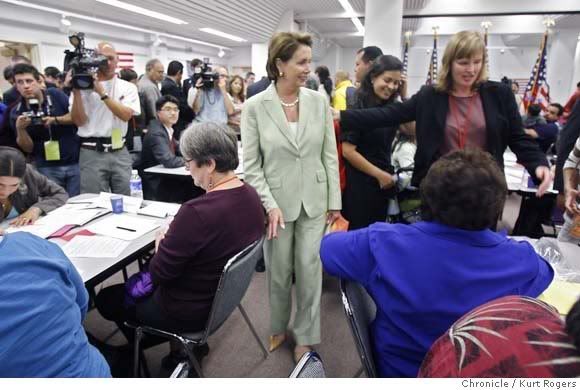Reuters reports:
The Democratic-led U.S. Congress on Thursday challenged President George W. Bush on children's health care and lost, setting the stage for an emotionally charged confrontation with Republicans in the 2008 elections.
The U.S. House of Representatives, in a 273-156 vote, failed to overturn Bush's veto of a plan to expand a popular health program to cover an additional 10 million children.
The vote fell 13 short of the two-thirds majority needed to overturn a presidential veto, giving Bush a victory but one Democrats are likely to use against his Republicans, even though many supported the bill, as they try to solidify their congressional majority.
"In the coming days, Democrats will not back down and we will insist on providing health care coverage to these 10 million children," said Rep. Rahm Emanuel, an Illinois Democrat.
House Speaker Nancy Pelosi, a California Democrat, after the vote said Congress intends to send Bush another bill in the next two weeks that covers the same number of youngsters.
Health and Human Services Secretary Mike Leavitt said in an interview he was "optimistic" the administration and Congress could work out their differences. The administration's goal is to sign-up 500,000 more eligible low-income children, he said.
The bill vetoed by Bush would have raised tobacco taxes to provide an extra $35 billion dollars over five years to provide health care for as many as 10 million children, compared to the 6.6 million currently enrolled.
Backers of the bill said the current $25 billion, five-year funding level and Bush's proposal to provide an extra $5 billion would not be enough even to cover the current number of children.
The battle over the program, which provides health coverage to children of families unable to afford insurance but who earn too much to qualify for the Medicaid health care program for the poor, has been intense and sometimes emotional.
"It's too bad that they are voting to harm children for really a bunch of petty grievances," Rep. Pete Stark, a California Democrat, said of Republicans who voted to sustain Bush's veto.
The bill is support by medical groups, including the American Medical Association and the American Academy of Pediatrics.
But Republicans have said the legislation was a stepping stone to government-run health care and that they also want to be sure that the program's benefits are not extended to higher income families and illegal immigrants.
The bill's backers had complained that many of the administration's arguments were misleading because the legislation did not allow coverage to illegal immigrants and discouraged states from including higher income families.
The administration accused Democrats of playing politics.
"As it is clear that this legislation lacks sufficient support to become law, now is the time for Congress to stop playing politics and to join the president in finding common ground to reauthorize this vital program," White House spokeswoman Dana Perino said in a statement.
Health care is becoming a major issue in campaigns for next year's presidential election and Republicans who voted with Bush have been pummeled by television and radio ads sponsored by unions and liberal advocacy groups.
MoveOn.org, the liberal online political action group, announced a new ad campaign targeting six Republicans who voted to sustain Bush's veto.
The bill represented a compromise between Democrats and a group of Senate Republicans.
Sen. Charles Grassley, an Iowa Republican who helped write the compromise, said in a statement that he would work with Democrats and Republicans in the House and Senate to get a bill "that can do one of two things, either get a presidential signature or enough votes in the House of Representatives."








